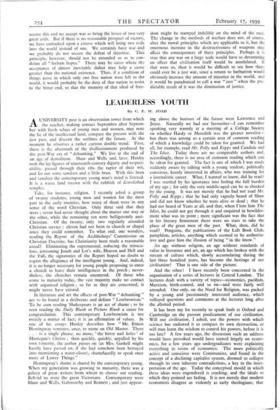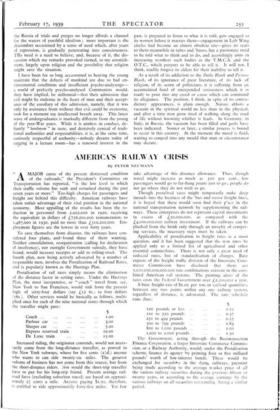LEADERLESS YOUTH
By C. E. M. JOAD
AUNIVERSITY post is an observation tower from which the teacher, making contact September after Septem- ber with fresh relays of young men and women, may note the lie of the intellectual land, compare the present with the just past, and discern the outlines of the future. At the moment he observes a rather curious double trend. First, there is the aftermath of the disillusionment produced by the post-War era of " debunking." We live at the end of an age of demolition. Shaw and Wells and, later, Huxley took the lay figures of nineteenth-century dignity and respect- ability, passed through their ribs the rapier of their wit, and let out some sawdust and a little bran. With this bran and sawdust the contemporary young man's mind is littered. It is a waste land strewn with the rubbish of demolished temples.
Take, for instance, religion. I recently asked a group of twenty students, young men and women for the most part in the early twenties, how many of them were in any sense of the word Christian. Only three said that they were ; seven had never thought about the matter one way or the other, while the remaining ten were belligerently anti- Christian. Of the twenty, only two regularly attended Christian service ; eleven had not been to church or chapel since they could remember. To what end, one wonders, reading the Report of the Archbishops' Commission on Christian Doctrine, has Christianity been made a reasonable creed? Eliminating the supernatural, reducing the miracu- lous, jettisoning Jonah and Lot's wife, Heaven and Hell and the Fall, the signatories of the Report hoped no doubt to regain the allegiance of the intelligent young. And, indeed, it is no longer necessary for young people proposing to enter a church to leave their intelligences in the porch ; never- theless, the churches remain unentered. Of those who come to maturity today, the vast majority make no contact with organised religion ; so far as they are concerned, it might never have existed.
In literature and art the effects of post-War " debunking " are to be found in a deliberate and defiant " Lowbrowism." To be seen reading Shakespeare is an act of shame ; to be seen reading the Daily Blank or Picture Blank a cause for congratulation. This contemporary Lowbrowism is not merely a matter of fact; it is an affirmation of values. In one of his essays Huxley describes how " Mr. Ernest Hemingway ventures, once, to name an Old Master. There . . is a single phrase, no more, ' the bitter nail holes ' of Mantegna's Christs ; then quickly, quickly, appalled by his own temerity, the author passes on (as Mrs. Gaskell might hastily have passed on, if she had somehow been betrayed into mentioning a water-closet), shamefacedly to speak once more of Lower Things."
Hemingway's shame is shared by the contemporary young. When my generation was growing to maturity, there was a galaxy of great writers from whom to choose our reading. Behind us were the great Victorians. Contemporary were Shaw and Wells, Galsworthy and Bennett ; and just appear- ing above the horizon of the future were Lawrence and Joyce. Naturally we had our favourites—I can remember speaking very warmly at a meeting of a College Society on whether Hardy or Meredith was the greater novelist— but there was among us a certain area of common reading of which a knowledge could be taken for granted. We had all, for example, read Mr. Polly and Kipps and Candida and The Idiot. Today there are no comparable authors and, accordingly, there is no area of common reading which can be taken for granted. The fact is one of which I was made suddenly aware by talking with a young student, politically conscious, keenly interested in affairs, who was training for a journalistic career. What, I wanted to know, did he read? I was startled by his ignorance into feeling the full burden of my age ; for only the very middle-aged can be so shocked by the young. It was not merely that he had not read Mr. Polly and Kipps ; that he had only vaguely heard of Shaw and did not know whether he were alive or dead ; that he had not heard of Yeats at all, and that, when I lent him The Idiot, he could not get through it and enquired in bewilder- ment what was its point ; more significant was the fact that in his literary firmament there were no stars to take the place of the great men of the past. What, then, did he read? Penguins, the publications of the Left Book Club, pamphlets, articles, anything which seemed to be authorita- tive and gave him the illusion of being " in the know."
An age without religion, an age without standards of value in literature and art, an age which has broken with the stream of culture which, slowly accumulating during the last three hundred years, has become the heritage of our civilisation! That is one side of the picture.
And the other! I have recently been concerned in the organisation of a series of lectures in Central London. The lectures dealt with a variety of topics—economics, pacifism, Marxism, birth-control, and so on—and were fairly well attended. One only, on the Need for Religion, was packed by a young and passionately interested audience, which volleyed questions and comments at the lecturer long after the allotted period.
It has been my lot recently to speak both at Oxford and Cambridge on the present predicament of our civilisation. Will our civilisation, I asked, use the powers with which science has endowed it to compass its own destruction, or will man learn the wisdom to control his powers, before it is too late? A few years ago, the discussion such an address would have provoked would have turned largely on econo- mics, for a few years ago undergraduates were explaining everything in terms of economics. The more politically active and conscious were Communists, and found in the concept of a declining capitalist system, doomed to collapse through its own inherent contradictions, a key to the inter- pretation of the age. Today the conceptual mould in which these ideas were engendered is cracking, and the ideals to which they pointed are fading. It is not merely that modern economists disagree as violently as early theologians; that the Russia of trials and purges no longer affords a channel for the waters of youthful idealism ; more important is the discomfort occasioned by a sense of need which, after years of repression, is gradually penetrating into consciousness. This need is a need to believe, and, because of it, the dis- cussion which my remarks provoked turned, to my astonish- ment, largely upon religion and the possibility that religion might save the situation.
I have been for so long accustomed to hearing the young maintain that the defects of mankind are due to bad en- vironmental conditions and insufficient psycho-analysings- a world of perfectly psycho-analysed Communists would, they have implied, be millennial—that their admission that evil might be endemic in the heart of man and their accept- ance of the corollary of this admission, namely, that it was only by assistance from without that evil could be overcome, took for a moment my intellectual breath away. This latest wave of undergraduates is markedly different from the young of the post-War years. While it is aimless in conduct, de- fiantly " lowbrow " in taste, and derisively cynical of tradi- tional authorities and respectabilities, it is, at the same time, curiously respectful of authority—nobody dreams today of lagging in a lecture room—has a renewed interest in the past, is prepared to listen to what it is told, gets engaged to its women before it marries them—engagement in Left Wing circles had become an almost obsolete rite—gives its seats to them meanwhile in tubes and 'buses, has a passionate need to be told what to think and to do, and accordingly joins in increasing numbers such bodies as the Y.M.C.A. and the O.T.C., which purport to be able to tell it. It will not, I think, readily forgive its elders for their inability to tell it.
As a result of its addiction to the Daily Blank and Picture Blank, of its ignorance of great literature, of its lack of religion, of its scorn of politicians, it is suffering from an accumulated fund of unexpended seriousness which it is ready to pour into any creed or cause which can command its allegiance. The position, I think, in spite of its contra- dictory appearances, is plain enough. Nature abhors a vacuum in the spiritual world no less than in the physical, and after a time men grow tired of walking along the road of life without knowing whither it leads. In Germany, in Italy, in Russia, the vacuum has been filled and goals have been indicated. Sooner or later, a similar process is bound to occur in this country. At the moment the mood is fluid, waiting to congeal into any mould that man or circumstance may dictate.











































 Previous page
Previous page